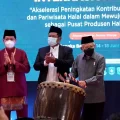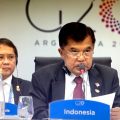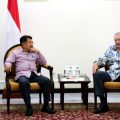Sharm El-Sheikh, wapresri.go.id – Indonesia’s efforts in dealing with the climate change crisis seems to be more concrete than many other countries. This can be seen from the various strategic efforts made, including reducing greenhouse gas emissions significantly.
“Indonesia keeps striving to lead by example through various positive efforts, such as increasing Indonesia’s emission reduction target in the Enhanced Nationally Determined Contribution to 31.89% with its own capabilities and 43.20% with international support,” said Vice President KH Ma’ruf Amin in his statement to the media, at the Indonesian Pavilion, Sharm El Sheikh Convention Center (SHICC), Sharm El Sheikh, Egypt, Tuesday (08/11/2022).
According to the Vice President, Indonesia had a strategic position in dealing with climate change, especially as the holder of the 2022 G20 Presidency and ASEAN Chair in 2023.
“Indonesia’s role in the collaboration is very strategic, because Indonesia, apart from being the President of the G20, will also be the Chair of ASEAN in 2023,” he said.
Furthermore, the Vice President gave an example of the importance of cooperation and collaboration in dealing with a crisis, especially when no country was able to deal with the Covid-19 pandemic independently.
“We must make this collaboration and cooperation an impetus. In this pandemic, no single country can work alone,” he explained.
Furthermore, the Vice President said that the increase in Indonesia’s emission reduction targets was in line with significant developments in Indonesia’s policies, such as expanding nature conservation and restoration, implementing a carbon tax, achieving Forestry and Other Land Uses (FOLU) Net-Sink 2030, developing an electric vehicle ecosystem, and initiating B40 biodiesel program.
Then, continued the Vice President, to ensure funding for the energy transition, Indonesia launched the Country Platform for Energy Transition Mechanism. However, according to him, all these national efforts required clear international support, including the creation of an effective and equitable carbon market, investment for energy transition, and funding for climate action.
“As the G20 Presidency, Indonesia continues to push for a green recovery and strong and inclusive climate action,” he stressed.
On this occasion, the Vice President also reminded and emphasized to the participants of the COP27 Summit that all together must take concrete steps to overcome climate change.
“For that, everything must strengthen collaboration based on dialogue and trust. To create a better and more sustainable world,” the Vice President said.
On the other hand, the Vice President also emphasized the importance of protecting archipelagic countries, especially from drowning. Therefore, he also invited the international community to give more support and attention to the archipelagic country.
“We want to invite the international community to pay attention to the problems of archipelagic countries,” he concluded.
Meanwhile, the Minister of Environment and Forestry Siti Nurbaya Bakar presented some concrete data regarding the results of reducing deforestation in Indonesia, such as an award from the Norwegian Government in the form of payment for the performance of reducing greenhouse gas emissions as well as a budget from the World Bank.
“We have received Result Based Payment, meaning that the reward for our work, namely from Norway, was 56 million dollars, that was about 2 to 3 weeks ago. Today I received news again that the World Bank’s GCF (Green Climate Fund) has also handed over to BPDLH (Environmental Fund Management Agency) a total of 20.9 million dollars,” said Minister Siti.
“So it’s not just about the money, but that it is the appreciation of the hard work,” he added.
For information, the Government of Norway is building a new partnership with the Government of Indonesia in the field of climate change and forestry through support for the implementation of Forestry and Other Land Uses (FoLU) Net Sink 2030.
In addition to reducing emissions from deforestation and forest degradation, the cooperation also includes forest protection and management involving community participation, as well as capacity building to strengthen natural forest carbon sequestration through forest management.
Also accompanying the Vice President, Deputy Minister of Environment and Forestry, Alue Dohong, and Special Staff of the Vice President, Masduki Baidlowi. (DMA/LHS – BPMI Setwapres)







